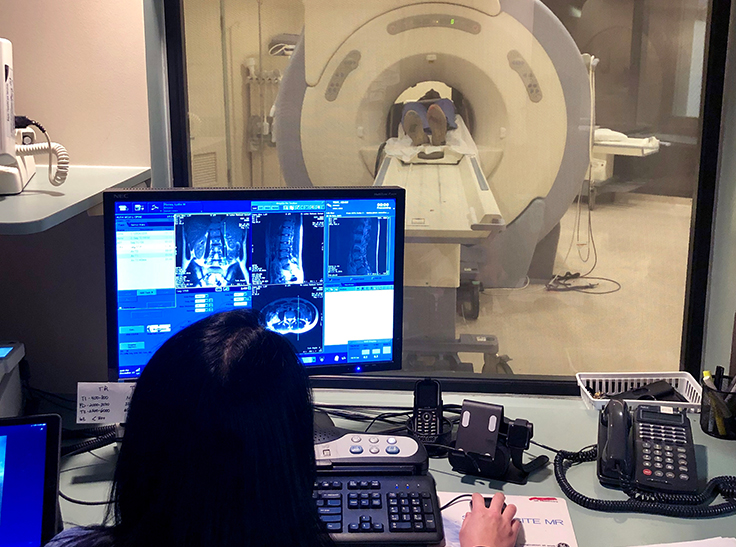INTERESTED IN LEARNING MORE?
REQUEST INFOINTERESTED IN LEARNING MORE?
REQUEST INFOIf you are an MRI technologist currently working in the field interested in becoming a registered MRI tech, it’s easier than ever to get started. WCUI School of Imaging offers a Magnetic Resonance Imaging Qualification Certificate program that can be completed in a matter of months, allowing you to grow your knowledge and become eligible to take the ARRT (MR) registry exam.
In addition to meeting WCUI’s general admissions requirements, MRI Qualification Certificate applicants must also:
Be a non-registered MR Technologist who has graduated from an associate’s degree program and meets at least one of the criteria below:
OR
MRI Qualification Certificate applicants must meet with the Program Director prior to enrollment in the program and provide proof of completion/transcripts of the associate’s (or other) degree.
Certification requirements for MRI technologists vary from state to state, with some requiring certification and some not. Most employers will tell you, though, that they look for candidates who have passed the necessary exams from the appropriate organizations when they’re hiring. That’s why WCUI provides resources to help you get ready for the exams you need. Our MRI certificate is geared toward a technologist that already has their ARRT(R) in radiography and would like formal education to help them sit for and pass the Advanced‐Level Magnetic Resonance Imaging (MRI) examination through ARRT. Graduates of the program are eligible to sit for the ARRT (MR) exam.
Through classroom lectures and hands-on experience, including an externship, students in our Magnetic Resonance Imaging Qualification Certificate will learn:
Our mission and values at WCUI are about promoting the academic excellence and integrity of our graduates in a way that is supportive and contributes positively to our students’ lives. We are here for you, to get you the healthcare training you need for success.
Magnetic resonance imaging — often called MRI — is one of the more detailed and dynamic forms of medical imaging available. It uses magnetic fields and radio waves to take detailed pictures of the insides of the body, giving physicians a non-invasive way to see what’s going on in a patient. MRI is unique in that it can look through bones or gas-filled areas in ways that X-rays or ultrasounds can’t, giving us a more complete picture of the patient’s current state. MRIs can be used all over the body, including the head and brain.
As an MRI technologist, you’re tasked with managing both patients and equipment, so you’ll need to balance your technical skills with soft skills like communication and organization. You’ll like be asked to:
The path to becoming an MRI technologist starts with quality training through an accredited program, like the one at WCUI. Our MRI certificate program readies you with the skills and knowledge you need to begin a career as an entry-level MRI technologist. You’ll learn how to use this technology to help a team of medical professionals in the diagnosing, monitoring, and treatment of diseases.
MRI technologists also need:
Our MRI associate degree program features both lecture-based courses and lab work in:

The healthcare field is expected to see a significant boom in employment as the U.S. population continues to age and the rate of conditions like cancer and Alzheimer’s disease increases. Preventative and diagnostic services like MRIs will see the demand go up significantly, adding thousands of jobs to the field through 2030.
*State of California EDD https://www.labormarketinfo.edd.ca.gov/data/employment-projections.html “Projected growth” represents the estimated change in total employment over the projections period (2018-2028).
**Arizona Commerce Authority https://www.azcommerce.com/oeo/labor-market/employment-projections/ “Projected growth” represents the estimated change in total employment over the projections period (2020-2030)
Of the 42,000 MRI technologists who worked in the U.S. as of May 2020, over half of them were at hospitals, including state, local, private, research, and specialty hospitals. But thousands of MRI techs are also employed at other kids of healthcare facilities, including:
WCUI’s Magnetic Resonance Imaging (Short) diploma program can be completed in as few as 9 months. Upon completion, graduates are eligible to sit for the American Registry of Radiologic Technologists certification registration in Advanced‐Level Magnetic Resonance Imaging (ARRT(MRI)).
In response to COVID-19, WCUI has moved to a hybrid educational model so your education doesn’t miss a beat. Our program combines online lecture classes with in-person ultrasound labs and 6-months of externship at a hospital or clinical site.
WCUI was founded by well-respected medical professionals, and we’ve been using our experience and knowledge to help our students begin successful careers for over 20 years. We’ve been accredited by the Accrediting Commission of Career Schools and College as a private post-secondary vocational school since 2001.
Are you ready to advance your career by advancing your education? Find the information you need to apply to the WCUI School of Medical Imaging on our Admissions Page or contact our admissions team today.
ENROLLING NOW! Now enrolling for Spring Term starting April 1